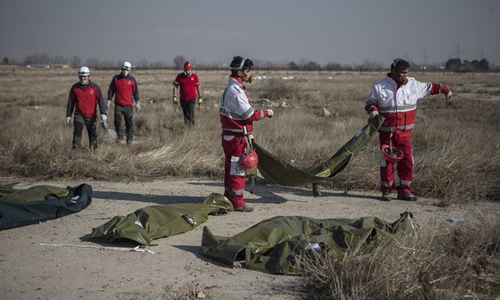HOME >> WORLD
Iran makes first arrests over jet downing
Source:Agencies Published: 2020/1/14 22:23:43
France, Germany, Britain trigger dispute mechanism: statement

Rescuers work beside the bodies of victims at the air crash site of a Boeing 737 Ukrainian passenger plane in Parand district, southern Tehran, Iran, on Jan. 8, 2020. (Photo by Ahmad Halabisaz/Xinhua)
Iran announced on Tuesday its first arrests over the shooting down of a Ukrainian airliner last week, as it struggles to contain the fallout from the disaster that sparked three days of protests.
The Ukraine International Airlines plane was brought down by a missile shortly after takeoff on Wednesday, killing all 176 passengers and crew on board.
Tehran for days denied Western claims based on US intelligence that the Boeing 737 had been downed by a missile. It came clean on Saturday when Revolutionary Guards aerospace commander Brigadier General Amirali Hajizadeh acknowledged a missile operator had mistaken the plane for a cruise missile and opened fire independently.
At a televised news conference, the judiciary announced the first arrests had been made over the calamitous blunder, without specifying how many.
"Extensive investigations have been carried out and some people have been arrested," said spokesman Gholamhossein Esmaili.
The announcement came shortly after Iranian President Hassan Rouhani said everyone responsible for the disaster must be punished.
The Kiev-bound plane was shot down at a time when Iran's armed forces were on heightened alert after launching a volley of missiles at Iraqi bases housing US troops.
Iran fired the missiles in retaliation for a US drone strike on January 3 that killed Qasem Soleimani, the head of the Guards' Quds Force foreign operations arm.
France, Britain and Germany confirmed on Tuesday that they had triggered the dispute mechanism in the Iran nuclear deal given Tehran's ongoing violations, but said they were not joining the US campaign to exert maximum pressure on Tehran.
"We do not accept the argument that Iran is entitled to reduce compliance with the JCPOA [known commonly as the Iran nuclear deal]," the three countries said in a joint statement, saying they had no choice but to trigger the process that could eventually lead to UN sanctions.
"Instead of reversing course, Iran has chosen to further reduce compliance."
Iran took a further step back from its commitments to the 2015 pact, with six world powers, by announcing on January 6 that it would scrap limits on enriching uranium, though it said it would continue cooperating with the UN nuclear watchdog.
Posted in: MID-EAST